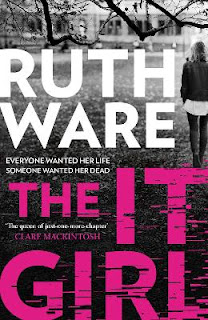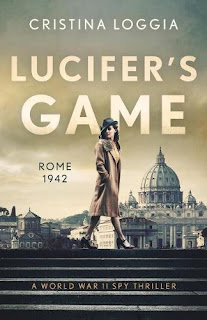Meet Ruth Ware Author Of The It Girl
This week sees the publication of Ruth Ware's brilliant seventh novel. The It Girl is the story of a murder, but was the right person convicted? Ruth tells TW about her original idea that the novel sprang from, why it was easy to write from an 18-year-old's perspective, creating dramatic tension ... and which cocktail that counts as one portion of fruit and veg is her favourite cocktail.
You can download the ebook of The It Girl from Amazon or buy the hardback from Thriller Women's list at Bookshop.org. NB: if you buy books through this link we may earn a commission from bookshop.org, whose fees support independent bookshops.
TW: Congratulations on the publication of The It Girl, your seventh thriller. It focuses on two first year students at Pelham, a fictional Oxford college, who are roommates. Can you please tell us more about Hannah and April, and how the two characters came to you?
RW: Thank you so much! Seven feels like a magic number in some way I can't quite identify, but it feels very exciting to be able to say "book seven".
In answer to your question, I can often pin down where plot ideas came to me, but I find it much harder to pinpoint where characters came from. They usually arise organically when I'm thinking about the plot, and then I get to know them better in the process of writing. In this case I had the idea to do a novel about someone who thinks she may have made a mistake giving evidence at a trial, evidence that is crucial to the conviction of the defendant, and sets out to find out if she did make a mistake and if so, fix it. So from the outset, I knew the person in question would have to care intensely about justice in order to put themselves through the wringer of resurrecting an old, ostensibly solved case. Hannah's character arose from that really - she is someone extremely principled, someone who would be unable to shrug and get on with her life. For a lot of reasons it would be reasonable for her to think she did her bit, and it wasn't her fault if the jury made the wrong decision. But I knew that the character at the heart of this was someone who would never be satisfied with shrugging off their part in a potential miscarriage of justice.
I wanted April to be someone in many ways polar opposite to Hannah - someone insouciant and happy-go-lucky, with much less care for the feelings and safety of others. I also wanted her to be someone really unforgettable - the kind of person you would spend the rest of your life thinking about, and not just because of the manner of her death. One of the themes of the novel is the way victims are treated - either blamed, or sanctified, and in some way defined by what happened to them and not by who they really were. I wanted April to be someone it was hard to put in a box - someone glittering and complicated and easy to both love and dislike - in contrast to the much more straightforward Hannah.
TW: Hannah is from a working class background whereas April is rich and privileged. Their friendship group at Pelham is a mixture of the two. How much is wealth and class part of the novel, and why do you think the contrast makes for great dramatic tension?
RW: I suppose it's a theme more by default, just because that's how Oxford, at least from the outside, seems to me. It's a place where many kids for the first time come into contact with people from class backgrounds entirely unlike their own. I went to a comprehensive school but several of my friends went to Oxford and Cambridge and I can still remember them wonderingly recounting how it was suddenly normal to meet people with parents who were Counts or Lords - something that until that point had seemed like a completely fairytale thing to me. Of course you know in theory that counts and countesses do exist, but you never expect to meet one in the wild. And of course it must be just as strange for people who come from private school backgrounds where that kind of thing is normal to meet people who were on free school meals, or a full student grant.
TW: here are two timelines in the novel, ten years ago when the girls are at Pelham, and the present day where Hannah is struggling to come to terms with her grief. You use these effectively to move the story along. Was it difficult plotting these dual timelines and how did you make sure to keep the reader hooked?
RW: Well of course the great secret to writing dual timelines is that actually they provide a brilliant way of balancing tensions. If a scene in one timeline is slightly flagging, you can simply make something exciting happen in the other! I didn't really sit down and plot out how everything would pan out - I had several scenes that I knew I wanted to include in the past timeline, in the run up to April's death, and then in the present day timeline there was a certain amount of investigation and scene setting that had to take place. I suppose I just played it by instinct as to how each one progressed.
RW: I didn't find it difficult to remember what life was like when I was 18. In many ways that time still feels extremely present to me - particularly as I have teenage kids so can see them moving towards that stage in their own lives. However I did have to consciously keep in mind what would have been different about Hannah's university experience vs my own - and the main thing was smartphones, which did not exist when I was at university (I didn't even have a mobile phone), along with social media in general.
College life was the aspect of the book that required the most research as I didn't go to Oxford myself, but to Manchester, which is a very different university experience - huge and sprawling and the absolute opposite, in many ways, of a closed college like Pelham. Luckily I had several friends at Oxford and had visited many times, so was able to draw on their memories, and the trips I'd made. This was particularly fortunate because I was writing in lockdown and so for most of the book it was impossible for me to physically visit Oxford.
TW: Without wishing to give away spoilers, there are twists, turns and red herrings in the novel, which also has an Agatha Christie-style locked room mastery. Did you plot the story out in advance or did these come to you whilst you were writing? How many drafts did you write?
RW: I don't really write drafts - that doesn't mean that each sentence is always perfect first time, but I edit and polish as I go along, so usually when I write "the end" I'm pretty close to pressing send to my editors. I also go back and shuffle things around if I feel I need to, but it's pretty rare for me to do a big structural change halfway through a book (One by One is probably the only time I've done this, and The Woman in Cabin 10 when I took out what felt at the time to be a fairly significant strand during the editing). What I do almost always know (and this book was no exception) was who did it, how, and usually why. So that's the extent of my plotting - I know all the time that I'm working towards X being guilty, and trying to seed in enough clues and red herrings that the reader has the chance of guessing the truth, but hopefully doesn't (or not completely).
TW: Out of all the novels you have written, which is your favourite and why?
RW: I cannot possibly choose one. That would feel completely unfair to the others! I will say that I have a particular soft spot for In a Dark, Dark Wood as being my first, and the book that made so many dreams come true for me, and of course the book I'm writing at the moment is my baby and probably the closest to my heart as being the most vulnerable and unfinished. An unfinished book is always something of an unscratched lottery card. It could end up being a total dud - or the thing that opens all the doors for you.
TW: Which other thriller novelists do you like to read for fun or is it too much of a busman's holiday for you and you prefer reading other genres in your downtime?
TW: How long does it usually take you to write a novel? Any exclusives on what your next book will be about?
RW: It generally takes me about a year. My next novel is about a pen tester. But not that kind of pen. I'll let google solve that one for you if you don't know what I mean!
TW: Oxford University of the University of Life?
RW: I don't know about Oxford specifically, but I think university in general is a wonderful experience. There's very few points later in life where you have nothing to do except make friends and expand your mind. I have periodic fantasies about going back and doing an MA in something completely foolish and esoteric.
TW: Favourite cocktail?
RW: Caipirinha. Also, one of your five a day, so bonus!
TW: Favourite memory from ten years ago?
RW: 2012 was actually a pretty awful year for me (my dad died) so not many! Sorry, that's a bit of a downer isn't it.
RW: Autumn. The first crisp frost, a sunny morning, leaves crunching underfoot. Heaven.
TW: I think I can guess your answer to this one... Miss Marple or Hercule Poirot?
RW: Marple of course! But I love both.
Thanks Ruth!
More about The It Girl:
We've all known someone like her. Effortlessly popular and self-assured. Everything comes easy to them. They want for nothing. But not everything is always as it seems. And not everyone is a fan.Loved by some. Hated by others... someone has murder in mind for this it girl.
To Hannah, April had it all. Confidence, money, brains, friends, good looks. She was someone shy Hannah aspired to be. Pushed together as roommates, soon they became best friends and Hannah is swept away in a lifestyle she'd only ever dreamed of.
But someone didn't like popular April. Someone hated her - hated her enough to kill her.
Ten years later, Hannah has tried to move on with her life. Happily married and expecting her first child, what Hannah doesn't need is someone digging up the past. Especially when the man her testimony convicted of April's murder has just died.
But will re-opening the past help Hannah finally put April to rest - or will it reveal secrets that should have died with her?




Comments
Post a Comment